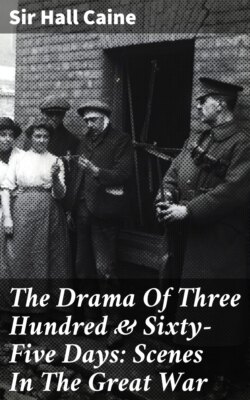Читать книгу The Drama Of Three Hundred & Sixty-Five Days: Scenes In The Great War - Sir Hall Caine - Страница 7
На сайте Литреса книга снята с продажи.
PEN-PORTRAIT OF THE CROWN PRINCE
ОглавлениеTable of Contents
And then the Crown Prince. In August of last year nine out of every ten of us would have said that not the father, but the son, of the Royal family of Germany had been the chief provocative cause of the war. Subsequent events have lessened the weight of that opinion. But the young man’s known popularity among an active section of the officers of the army; their subterranean schemes to set him off against his father; a vague suspicion of the Kaiser’s jealousy of his eldest son—all these facts and shadows of facts give colour to the impression that not least among the forces which led the Emperor on that fateful first of August to declare war against Russia was the presence and the importunity of the Crown Prince. What kind of man was it, then, whom the invisible powers of evil were employing to precipitate this insensate struggle?
Hundreds of persons in England, France, Russia, and Italy must have met the Crown Prince of Germany at more or less close quarters, and formed their own estimates of his character. The barbed-wire fence of protective ceremony which usually surrounds Royal personages, concealing their little human foibles, was periodically broken down in the case of the Heir-Apparent to the German Throne by his incursion every winter into a small cosmopolitan community which repaired to the snows of the Engadine for health or pleasure. In that stark environment I myself, in common with many others, saw the descendant of the Fredericks every day, for several weeks of several years, at a distance that called for no intellectual field-glasses. And now I venture to say, for whatever it may be worth, that the result was an entirely unfavourable impression.
I saw a young man without a particle of natural distinction, whether physical, moral, or mental. The figure, long rather than tall; the hatchet face, the selfish eyes, the meaningless mouth, the retreating forehead, the vanishing chin, the energy that expressed itself merely in restless movement, achieving little, and often aiming at nothing at all; the uncultivated intellect, the narrow views of life and the world; the morbid craving for change, for excitement of any sort; the indifference to other people’s feelings, the shockingly bad manners, the assumption of a right to disregard and even to outrage the common conventions on which social intercourse depends—all this was, so far as my observation enabled me to judge, only too plainly apparent in the person of the Crown Prince. 21
Outside the narrow group that gathered about him (a group hailing, ironically enough, from the land of a great Republic) I cannot remember to have heard in any winter one really warm word about him, one story of an act of kindness, or even generous condescension, such as it is easy for a royal personage to perform. On the contrary, I was constantly hearing tales of silly fooleries, of overbearing behaviour, of deliberate rudeness, such as irresistibly recalled, in spirit if not in form, the conduct of the common barrator in the guise of a king, who, if Macaulay’s stories are to be credited, used to kick a lady in the open streets and tell her to go home and mind her brats.
